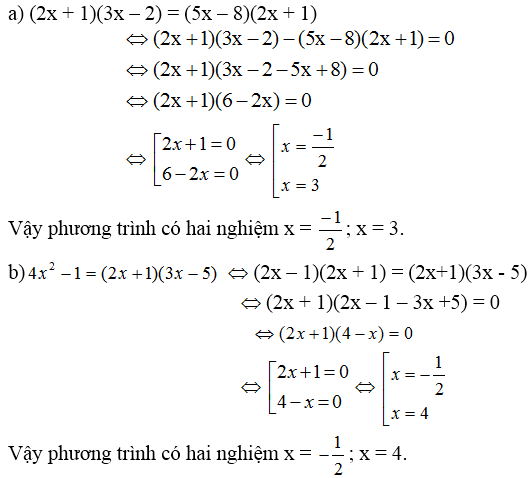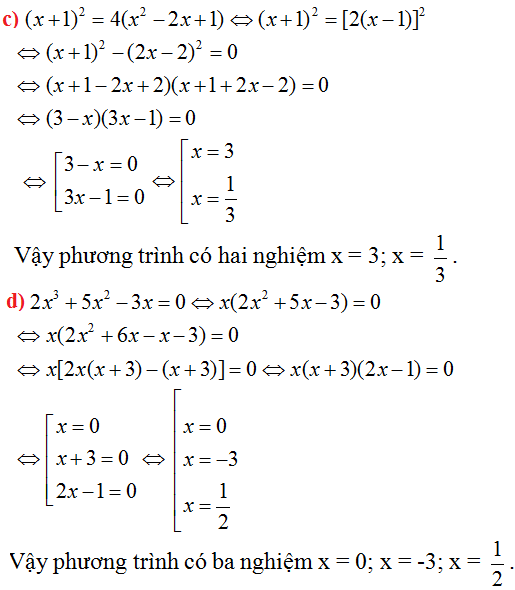Hãy nhập câu hỏi của bạn vào đây, nếu là tài khoản VIP, bạn sẽ được ưu tiên trả lời.

Bài 3:
a) \(\left(x-6\right).\left(2x-5\right).\left(3x+9\right)=0\)
\(\Leftrightarrow\left(x-6\right).\left(2x-5\right).3.\left(x+3\right)=0\)
Vì \(3\ne0.\)
\(\Leftrightarrow\left[{}\begin{matrix}x-6=0\\2x-5=0\\x+3=0\end{matrix}\right.\Leftrightarrow\left[{}\begin{matrix}x=6\\2x=5\\x=-3\end{matrix}\right.\Leftrightarrow\left[{}\begin{matrix}x=6\\x=\frac{5}{2}\\x=-3\end{matrix}\right.\)
Vậy phương trình có tập hợp nghiệm là: \(S=\left\{6;\frac{5}{2};-3\right\}.\)
b) \(2x.\left(x-3\right)+5.\left(x-3\right)=0\)
\(\Leftrightarrow\left(x-3\right).\left(2x+5\right)=0\)
\(\Leftrightarrow\left[{}\begin{matrix}x-3=0\\2x+5=0\end{matrix}\right.\Leftrightarrow\left[{}\begin{matrix}x=3\\2x=-5\end{matrix}\right.\Leftrightarrow\left[{}\begin{matrix}x=3\\x=-\frac{5}{2}\end{matrix}\right.\)
Vậy phương trình có tập hợp nghiệm là: \(S=\left\{3;-\frac{5}{2}\right\}.\)
c) \(\left(x^2-4\right)-\left(x-2\right).\left(3-2x\right)=0\)
\(\Leftrightarrow\left(x^2-2^2\right)-\left(x-2\right).\left(3-2x\right)=0\)
\(\Leftrightarrow\left(x-2\right).\left(x+2\right)-\left(x-2\right).\left(3-2x\right)=0\)
\(\Leftrightarrow\left(x-2\right).\left(x+2-3+2x\right)=0\)
\(\Leftrightarrow\left(x-2\right).\left(3x-1\right)=0\)
\(\Leftrightarrow\left[{}\begin{matrix}x-2=0\\3x-1=0\end{matrix}\right.\Leftrightarrow\left[{}\begin{matrix}x=2\\3x=1\end{matrix}\right.\Leftrightarrow\left[{}\begin{matrix}x=2\\x=\frac{1}{3}\end{matrix}\right.\)
Vậy phương trình có tập hợp nghiệm là: \(S=\left\{2;\frac{1}{3}\right\}.\)
Chúc bạn học tốt!

a) đặt \(\left(x^2+x\right)\)là \(y\)
ta có: \(3y^2-7y+4\)\(=0\)
<=>\(\left(3y-4\right)\left(y-1\right)=0\)
còn lại bạn tự xử nhé

a); b) Do tích = 0
=> Từng thừa số = 0 và ta nhận xét: \(x^2+2;x^2+3>0\)
=> a) \(\orbr{\begin{cases}x=1\\x=-\frac{5}{2}\end{cases}}\)
và câu b) \(\orbr{\begin{cases}x=\frac{1}{2}\\x=5\end{cases}}\)
a; *x-1=0 <=>x=1
*2x+5=0 <=>x=-2,5
*x2+2=0 <=> ko có x
b; tương tự a

a) (x-1)(5x+3)=(3x-8)(x-1)
= (x-1)(5x+3)-(3x-8)(x-1)=0
=(x-1)[(5x+3)-(3x-8)]=0
=(x-1)(5x+3-3x+8)=0
=(x-1)(2x+11)=0
\(\Leftrightarrow\) x-1=0 hoặc 2x+11=0
\(\Leftrightarrow\) x=1 hoặc x=\(\dfrac{-11}{2}\)
Vậy S={1;\(\dfrac{-11}{2}\)}
b) 3x(25x+15)-35(5x+3)=0
=3x.5(5x+3)-35(5x+3)=0
=15x(5x+3)-35(5x+3)=0
=(5x+3)(15x-35)=0
\(\Leftrightarrow\) 5x+3=0 hoặc 15x-35=0
\(\Leftrightarrow\) x=\(\dfrac{-3}{5}\) hoặc x=\(\dfrac{7}{3}\)
Vậy S={\(\dfrac{-3}{5};\dfrac{7}{3}\)}
c) (2-3x)(x+11)=(3x-2)(2-5x)
=(2-3x)(x+11)-(3x-2)(2-5x)=0
=(3x-2)[(x+11)-(2-5x)]=0
=(3x-2)(x+11-2+5x)=0
=(3x-2)(6x+9)=0
\(\Leftrightarrow\) 3x-2=0 hoặc 6x+9=0
\(\Leftrightarrow\) x=\(\dfrac{2}{3}\) hoặc x=\(\dfrac{-3}{2}\)
Vậy S={\(\dfrac{2}{3};\dfrac{-3}{2}\)}
d) (2x2+1)(4x-3)=(2x2+1)(x-12)
=(2x2+1)(4x-3)-(2x2+1)(x-12)=0
=(2x2+1)[(4x-3)-(x-12)=0
=(2x2+1)(4x-3-x+12)=0
=(2x2+1)(3x+9)=0
\(\Leftrightarrow\)2x2+1=0 hoặc 3x+9=0
\(\Leftrightarrow\)x=\(\dfrac{1}{2}\)hoặc x=\(\dfrac{-1}{2}\) hoặc x=-3
Vậy S={\(\dfrac{1}{2};\dfrac{-1}{2};-3\)}
e) (2x-1)2+(2-x)(2x-1)=0
=(2x-1)[(2x-1)+(2-x)=0
=(2x-1)(2x-1+2-x)=0
=(2x-1)(x+1)=0
\(\Leftrightarrow\) 2x-1=0 hoặc x+1=0
\(\Leftrightarrow\) x=\(\dfrac{-1}{2}\) hoặc x=-1
Vậy S={\(\dfrac{-1}{2}\);-1}
f)(x+2)(3-4x)=x2+4x+4
=(x+2)(3-4x)=(x+2)2
=(x+2)(3-4x)-(x+2)2=0
=(x+2)[(3-4x)-(x+2)]=0
=(x+2)(3-4x-x-2)=0
=(x+2)(-5x+1)=0
\(\Leftrightarrow\) x+2=0 hoặc -5x+1=0
\(\Leftrightarrow\) x=-2 hoặc x=\(\dfrac{1}{5}\)
Vậy S={-2;\(\dfrac{1}{5}\)}

a)(2x+1)(3x-2)=(5x-8)(2x+1)
⇔(2x+1)(3x-2)-(5x-8)(2x+1)=0
⇔(2x+1)(3x-2-5x+8)=0
⇔(2x+1)(-2x+6)=0
⇔2x+1=0 hoặc -2x+6=0
1.2x+1=0⇔2x=-1⇔x=-1/2
2.-2x+6=0⇔-2x=-6⇔x=3
phương trình có 2 nghiệm x=-1/2 và x=3

Lời giải:
a)
\((x-2)(x-3)+2x=(x-2)^2-2\)
\(\Leftrightarrow (x-2)(x-2-1)+2x=(x-2)^2-2\)
\(\Leftrightarrow (x-2)^2-(x-2)+2x=(x-2)^2-2\)
\(\Leftrightarrow x+4=0\Rightarrow x=-4\)
b)
\((x-1)^2+3x(x-1)+7=(2x-1)^2+5(x-3)\)
\(\Leftrightarrow (x-1)^2+3x(x-1)+7=x^2+(x-1)^2+2x(x-1)+5(x-3)\)
\(\Leftrightarrow x(x-1)+7=x^2+5(x-3)\)
\(\Leftrightarrow 6x=22\Rightarrow x=\frac{11}{3}\)
c)
\(5(x^2-2x-1)+2(3x-2)=5(x+1)^2=5(x^2-2x+1)\)
\(\Leftrightarrow -5+2(3x-2)=5\)
\(\Leftrightarrow 3x-2=5\Rightarrow x=\frac{7}{3}\)
d)
\((x-1)(x^2+x+1)-2x=x(x-1)(x+1)=x(x^2-1)\)
\(\Leftrightarrow x^3-1-2x=x^3-x\Leftrightarrow -1-x=0\Rightarrow x=-1\)


YTrần Trung NguyênNguyenKhôi BùiLê Anh DuyPhùng Tuệ MinhNguyễn Quỳnh ChiGiang Thủy Tiên?Amanda?HISINOMA KINIMADO
Lập bảng xét dấu , sau đó tính ra